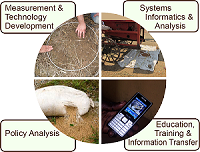Understanding Loss Prevention Through Research: A Blog Post Series
by Kari A. Wozniak
For the issue of postharvest loss which still lacks essential information, ADM Institute funded research provides important outcomes about prevention efforts. Key perspectives and learnings will be shared over coming months through a blog post series, ‘Learning from Research’.
The people across the world who care about preventing postharvest loss, which is growing in numbers, know that initiatives to curb losses need better, more reliable data. Most agree that despite the concerned acknowledgement of its impact, postharvest loss is an issue that still lacks essential information. This is a primary reason as to why the ADM Institute was founded at the University of Illinois, a premier research institution driven by a land-grant mission. With access to knowledge and expertise of highly-skilled faculty across major disciplines, the institute was established to generate scientific evidence and technologies to reduce postharvest loss. In short, to find, create, and use data.

© ADM Institute
By 2012, the ADM Institute had funded $2.5 million of research involving Illinois faculty and collaborators from universities, NGOs, government agencies, and the private sector from around the world. Seven major projects grouped into four themes have since focused on understanding and conceptualizing postharvest loss, as well as creating potential solutions to mitigate it.
Researchers have followed combines at harvest to collect loss samples, and tested moisture content in hermetically-sealed storage bags. They’ve built models for development of better infrastructure using high-tech applications of GIS mapping, as well as by addressing low-tech constraints on locally available construction materials. Many, in various locations throughout Brazil and India, have engaged local farmers and managers using surveys, interviews, and other methods.
These varied techniques have produced a deeper understanding of what types of postharvest loss data and information is needed among stakeholders and decision-makers. Even more so, it has shown what possibilities, as well as limitations, there are to cost-effectively gather and use data in a sustainable manner. Other important outcomes, including developing networks on international, national, and local scales, learning the perspectives of losses of farmers and managers, engaging students, and others, will be covered over the coming months in the blog post series, ‘Learning from Research’. We invite you to follow this series to learn more about ADM Institute’s funded research, and to share your questions and comments with us, the faculty, and our affiliates.